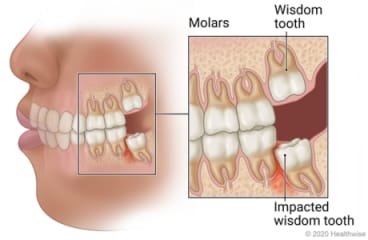
What are wisdom teeth?
Wisdom teeth are the upper and lower third molars. These teeth are at the very back of your mouth. They are the last teeth to surface in the mouth. They are called wisdom teeth because they usually come in when a person is between 17 and 21 years old.
Some people have their wisdom teeth for their entire life. Other people choose to have their wisdom teeth removed. Some people have these teeth taken out before they break through the gums.
An oral surgeon or dentist can remove wisdom teeth. The procedure can be done in the dentist's or surgeon's office. You may have the procedure in the hospital, if you are having all your wisdom teeth pulled at one time.
Your dentist will open up the gum tissue over the tooth and take out any bone that is covering the tooth. The dentist will separate the tissue that connects the tooth to the bone. Then the dentist will remove the tooth. The tooth may be cut into smaller pieces to make it easier to remove.
After the tooth is removed, you may need stitches. Some stitches dissolve over time. Some stitches have to be removed after a few days. Your dentist will tell you if your stitches need to be removed.
How do you prepare for the procedure?
Procedures can be stressful. This information will help you understand what you can expect. And it will help you safely prepare for your procedure.
 Preparing for the procedure
Preparing for the procedure
- Be sure you have someone to take you home. Anesthesia and pain medicine will make it unsafe for you to drive or get home on your own.
- Understand exactly what procedure is planned, along with the risks, benefits, and other options.
- If you take a medicine that prevents blood clots, your doctor may tell you to stop taking it before your procedure. Or your doctor may tell you to keep taking it. (These medicines include aspirin and other blood thinners.) Make sure that you understand exactly what your doctor wants you to do.
- Tell your doctor ALL the medicines, vitamins, supplements, and herbal remedies you take. Some may increase the risk of problems during your procedure. Your doctor will tell you if you should stop taking any of them before the procedure and how soon to do it.
- Make sure your doctor and the hospital have a copy of your advance directive. If you don't have one, you may want to prepare one. It lets others know your health care wishes. It's a good thing to have before any type of surgery or procedure.
What happens on the day of the procedure?
-
Follow the instructions exactly about when to stop eating and drinking. If you don't, your procedure may be canceled. If your doctor told you to take your medicines on the day of the procedure, take them with only a sip of water.
At the hospital or surgery center
-
Bring a picture ID.
-
You will be kept comfortable and safe by your anesthesia provider. You may get medicine that relaxes you or puts you in a light sleep. The area being worked on will be numb.
-
How long the procedure will take depends on how many teeth are removed.
When should you call your doctor?
- You have questions or concerns.
- You don't understand how to prepare for your procedure.
- You become ill before the procedure (such as fever, flu, or a cold).
- You need to reschedule or have changed your mind about having the procedure.
Where can you learn more?
Go to http://www.healthwise.net/patientEd
Enter G480 in the search box to learn more about "Wisdom Tooth Extraction: Before Your Procedure".
Current as of: September 30, 2025
Author: Ignite Healthwise, LLC Staff
Clinical Review Board
All Ignite Healthwise, LLC education is reviewed by a team that includes physicians, nurses, advanced practitioners, registered dieticians, and other healthcare professionals.

